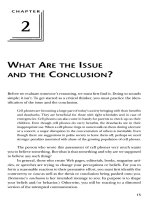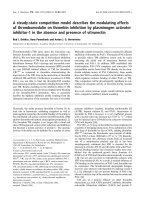Why do people in general and business managers in particular need to plan ahead? What are the side effects of not planning?
Bạn đang xem bản rút gọn của tài liệu. Xem và tải ngay bản đầy đủ của tài liệu tại đây (91.88 KB, 9 trang )
1
ENGLISH 1.3
Topic:
Why do people in general and business managers in particular need
to plan ahead? What are the side effects of not planning?
I. Introduction
No one wants to think about a time when you have to face with difficulties.
So planning ahead for this possibility often gets put off. Your options are
often limited by lack of information. Therefore, planning ahead allows you
to have more control over your future.
II. Focus
1. The importance of the planning
1.1. What is the plan?
Planning mean looking ahead and chalking out future courses of action to
be followed. It is a preparatory step. It is a systematic activity which
determine when, how and who is going to perform a specific job. Planning
is a detailed programmer regarding future courses of action. It is rightly
said “Well plan is half done”. Therefore, planning takes into consideration
available and prospective human and physical resources of the organization
so as to get effective co-ordination, contribution and perfect adjustment. It
is the basic management function which includes formulation of one or
more detailed plan to achieve optimum balance of needs or demands with
available resources.
You’ve got to have a plan. A Plan is a map, a guide, a target, a focus, a
route, a signpost, a direction, a path, a strategy.
It says you are going to go somewhere, do something, be somewhere by a
certain time. It gives your life structure and shape, gravitas and power. If
you allow life to turn up any old thing you’ll be floating downstream as
quick as you like.
2
Ok, so not all plans work out, not all plans lead to treasure. But at least
you’re in with a better chance if you have a map and a shovel than if you
just dig at random – or, like most people, don’t dig at all.
1.2. The importance of the planning
The importance of the planning function should have be clear to you. We
can recognize the importance of planning function as follows:
Provides Direction: Planning provides a clear sense of direction to the
activities of the organization and to the job behavior of managers and
others. It strengthens their confidence in understanding where the
organization is heading and what for, how best to make the organization
move along the chosen path, and when should they take what measures to
achieve the goals of the organization.
Provides opportunity to analyze alternative courses of action: Another
source of importance of planning is that it permits managers to examine
and analyze alternative course of action with a better understanding of their
likely consequences. If managers have an enhanced awareness of the
possible future effects of alternative courses of action, for making a
decision or for taking any action, they will be able to exercise judgment
and proceed cautiously to choose the most feasible and favorable course of
action.
Reduces uncertainties: Planning forces managers to shake off their inertia
and insular outlook; it induces them to look beyond those noses, beyond
today and tomorrow, and beyond immediate concerns. It encourages them
to probe and cut through complexities and uncertainties of the environment
and to gain control over the elements of change.
3
Minimizes impulsive and arbitrary decisions: Planning tends to
minimize the incidence of impulsive and arbitrary decisions and ad hoc
actions; it obviates exclusive dependence on the mercies of luck and chance
elements; it reduces the probability of major errors and failures in
managerial actions. It injects a measure of discipline in managerial
thinking and organizational action. It improves the capability of the
organization to assume calculated risks. It increases the freedom and
flexibility of managers within well-defined limits.
King-pin function: As stated earlier, planning is a prime managerial
function which provides the basis for the other managerial functions. The
organizational structure of task and authority roles is built around
organizational plans. The functions of motivation, supervision, leadership
and communication are addressed to implementation of plans and
achievement of organizational objectives. Managerial control is
meaningless without managerial planning. Thus, planning is the king-pin
function around which other functions are designed.
Resource Allocation: Planning is means of judicious allocation of strategic
and scarce resources of the organization in the best possible manner for
achieving strategic goals of the organization. The strategic resources
include funds, highly competent executives, technological talent, good
contacts with government, exclusive dealer network and so on. If the
organization enjoys a distinct advantage in possession of such resources, a
careful planning is essential to allocate them into those lines which would
strengthen the overall competitive position of the organization.
Resource use efficiency: For an ongoing organization, planning
contributes towards a more efficient functioning of the various work units.
There is better utilization of the organization's existing assets, resources
4
and capabilities. It prompts managers to close gaps, to plug loopholes, to
rectify deficiencies, to reduce wastage and leakages of funds, materials,
human efforts and skills so as to bring about an overall improvement in
resource use efficiency.
Adaptive responses: Planning tends to improve the ability of the
organization to effectively adapt and adjust its activities and directions in
response to the changes taking place in the external environment. An
adaptive behavior on the part of the organization is essential for its survival
as an independent entity. For a business organization, for example,
adaptive behavior is critical in technology, markets, products and so on.
Anticipative action: While adaptation is a behavior in reaction and
response to some changes in the outside world, it is not enough in some
situations. In recognition of this fact, planning stimulates management to
act, to take hold initiatives, to anticipate crises and threats and to ward them
off, to perceive and seize opportunities ahead of other competitions, and to
gain a competitive lead over others. For the purpose, some enterprises
establish environmental scanning mechanism as part of their planning
systems. Thereby such enterprises are able to direct and control change,
instead of being directed and controlled by the pervasive external forces of
change.
Integration: Planning is an important process to bring about effective
integration of the diverse decisions and activities of the managers not only
at a point of time but also over a period of time. It is by reference to the
framework provided by planning that managers make major decisions on
organizational activities, in an internally consistent manner.
5
2. The side effects of not planning
As we know as, planning ahead have many advantages. I sure that if you
don’t have a plan before working, you can’t succeed. You believe, don’t
you? Now, we together research about: What are the side effects of not
planning?
Firstly, You can’t identify problems before implement.
Everything contains opportunities and hidden perils. You can be very very
talent but you don’t anticipate all things. So, if you don’t plan, you will be
caught in perils or miss out opportunities. Of course, you expect your
business to succeed, but what you have to remember is that, on the way to
succeeding, there will be pitfalls. If you do not plan, your business could be
mired into the pitfalls and never get out of them
On the contrary, when you plan, it can help forecast future problems and
make any necessary changes up front to avoid them. Of course, surprises
— such as the 1973 quadrupling of oil prices — can always catch an
organization short, but many changes are easier to forecast. Planning for
these potential problems helps to minimize mistakes and reduce the
“surprises” that inevitably occur.
Secondly, Wrong direction
You’ve got to have a plan. A Plan is a map, a guide, a target, a focus, a
route, a signpost, a direction, a path, a strategy.
It says you are going to go somewhere, do something, be somewhere by a
certain time. It gives your life structure and shape, gravitas and power. If
you allow life to turn up any old thing you’ll be floating downstream as
quick as you like
6
Not planning results in setting up in appropriate objectives or plans.
Inappropriate objectives cause the organization to direct its efforts in the
wrong directions, or to put in too much or too little efforts. A business
introducing a new product in a market may follow different objectives such
maximizing immediate profit, or maximizing sale sales volume, and the
prices it sets for the product will be very much influenced by the objective.
Immediate profit maximization may point to setting up high skimming
prices, while objective of sales maximization is better served by low
penetration prices. Unless there is clarity about the objectives of setting the
price levels, the likelihood of setting the prices at correct levels are low.
Similarly, the selling and advertising efforts to be put in for this product
will depend on target sales volume. If the sales volume targets are too low
full sales potential will not be achieved. It the sales targets are too
ambitious, efforts and cost incurred in sales and advertising will be wasted
in following unrealistic objectives.
Thirdly, Lose control:
A plan indicates you’ve had a bit of a think about your life and aren’t just
waiting for something to turn up. Or, again like most people, not even
thinking about it but going through life perpetually surprised by what
happens.
Work out what it is you want to do, plan it, work out the steps to take to
achieve your goal, and get on with it. If you don’t plan your plan, it will
remain a dream.
So what happens when you don’t have a plan? Well, you reinforce to
yourself, your sense of being ‘not in control’. Once you have a plan
everything falls into place. Once you have a plan, the logical steps to
achieve that plan also become available, accessible. Not planning causes:
7
- Long transitions and waning enthusiasm.
- Unnecessary stress.
- Possibility of behavioral challenges due to waiting
- An activity may not to complete
What if you don’t have a plan? You will end up in other people’s plan. Yes,
indeed, if you don’t have a plan, then you will end up becoming part of
people’s plan. If you don’t have a plan, then it will be the same as you’ve
arrived to a new city and don’t know where to head to. You will end up in
nowhere. Having a plan is equally important as having a clear goal. A goal
without a plan is just a dream.
A plan isn’t a dream – it’s something you intend doing rather than
something you want to do. An having a plan means you’ve thought through
how you’re going to do it.
Of course, just because you have a plan doesn’t mean that you have to stick
to it, to follow it, to obey it to the letter come hell or high water. The plan is
always up for review, for improvement, for changing as and when you need
to. The plan shouldn’t be rigid. Circumstances change, you change, your
plans change. The details of the plan doesn’t matter. Having one does.
Lastly, Failure
The failure to plan is planned failure. Without an action plan to begin to
guide a business or even an individual, the end result is usually walking
down the wrong path along with a lot of spraying and praying going on.
In order to succeed at anything you've got to have a plan. Business is no
different. Yet, depending on the type of business you're operating, the plan
will vary.
8
For example, if you are raising money from investors or bringing a
company public, you need a lengthy and comprehensive plan. It must not
only provide a realistic strategy for running the business successfully, but it
must also demonstrate to potential investors your knowledge of the
business and your ability to foresee problems and solve them. A good plan
will also include comprehensive market research and your response to it,
and a detailed performa that shows worst case, best case and most likely
financial projections over a three to five year period. It takes three to five
months to put a comprehensive business plan together.
Few days ago, my neighbor told me that he had a string of bad luck. After
he and his partner purchased an established business, two key employees
left and so did a significant part of the revenue. Also, with the retirement of
the owner, existing loyal customers left because their loyalty was to the
past owner and not to the current ones. This was all contributed to bad
luck!
After listening to the individual complain, I asked him: "Would your
outcomes be different if you had taken the time to ask yourself this
question: What happens if a key employee left?"
The response was "Sure, but I did not think about any employee leaving.
The business was over 30 years old and very well established. All the
records were in tact and everything looked good on paper.
An old quote states: "Good luck happens when preparedness meets
opportunity."
So possibly the reverse is true that "bad luck happens when no planning
meets the unknown."
This creates a working harder not smarter business environment. The
business owners in the earlier story are both discouraged because what they
9
believed to be some easy money now has become a daily effort just to keep
the doors open.
If you want luck, then make it part of your action plan. Commit your goals
to writing. Work your action plan, plan your work. Then see all of the luck
come your way or if you want believe that you have been lucky.
III. Conclusion
As a military said, “If you fail to plan, you plan to fail”. This is very true.
Without a plan, people are set up to encounter errors, waste, and delays. A
plan, on the other hand, helps people organize resources and activities
efficiently and effectively to achieve goals. Nothing in our life happens
automatically, everything needs a plan. Every successful people know this,
if they want to succeed, they will need to have a plan which leads them
there
Did you know what you should do now? If you don’t, you must plan your
steps now. What are you going to do to achieve your goals? This is another
great key you need to keep in your pocket and use it when necessary. Use it
wisely to open the door to success.









